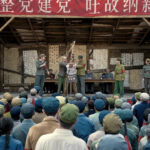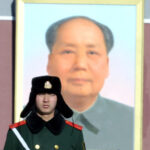Song Binbin, China’s Most Famous Red Guard, Dies at 77, by Liyan Qi at liyan.qi@wsj.com Sept. 27, 2024 12:00 pm ET
 She epitomized the deadly fervor of the Cultural Revolution and later apologized for her actions. In the U.S., she was considered just a scientist.
She epitomized the deadly fervor of the Cultural Revolution and later apologized for her actions. In the U.S., she was considered just a scientist.
Song Binbin presented Mao Zedong with a red armband in 1966 in a famous photo. APIC/GETTY IMAGES
A wave of violence
Apologies from the Red Guard
‘An open wound’
In China, Song Binbin was the face of Cultural Revolution turmoil, the Red Guard who helped spark the deadly persecution of teachers and was given a nickname that means “militant” by Mao Zedong.
In the U.S., Song, who died Sept. 16 at age 77, was a scientist who analyzed air quality for the commonwealth of Massachusetts.
Her classmates at the Massachusetts Institute of Technology, where she earned a 1989 doctorate, knew almost nothing of her past in China, including that she was Communist Party royalty, the daughter of a general who was one of the People’s Republic’s founders known as the Eight Immortals.
They knew even less of the 1966 events that defined her life.
 Song was a leader of the Red Guards at her school in Beijing, pictured here in 2010. PHOTO: TOM LASSETER/TRIBUNE NEWS SERVICE/GETTY IMAGES
Song was a leader of the Red Guards at her school in Beijing, pictured here in 2010. PHOTO: TOM LASSETER/TRIBUNE NEWS SERVICE/GETTY IMAGES
In June that year, Song was a leader of the Red Guards, a student movement fiercely devoted to Mao, at her girls school in Beijing. With two other students, she posted a handwritten denouncement of one of the school’s officials, which set off a summer of riots, with students’ persecuting of teachers and anyone they saw as betraying Mao’s teachings.
The riots culminated in the torture and fatal mob beating of school official Bian Zhongyun—the woman Song and the other students had denounced. (Decades later, Song apologized for her role in the events but denied being involved in the beating or any violence.)
Two weeks after the killing in August 1966, crowds gathered in Beijing’s Tiananmen Square, where Mao spoke directly to tens of thousands of Red Guards as loudspeakers played the revolutionary song “The East Is Red.” Mao saw the deeply loyal students as a weapon in an upheaval that he believed would save China from a rise in capitalist thinking.
One of the young people invited onto the dais was Song, who pinned an armband on Mao in a moment captured in a well-known photo.
After asking about her name, Mao suggested she should change her first name from Binbin, which means “civil,” to Yaowu, which refers to someone who is militant. Song never adopted the moniker, though the People’s Daily newspaper used it as the byline for what it claimed was a first-person essay by a Red Guard. Song denied she wrote it.
A wave of violence
Mao’s embrace of the Red Guards in Tiananmen Square unleashed a wave of political violence. In the weeks after Bian’s death, 1,772 people died in Beijing alone, according to the Beijing Daily, an official newspaper.
The political turmoil consumed China for a decade and has sometimes been likened to a civil war. Political loyalties fluctuated during this time, and Song herself eventually joined the millions sent for rural “re-education,” ending up in Inner Mongolia.
After the Cultural Revolution ended, Song and her husband joined the first wave of Chinese studying overseas in the 1980s, first earning a master’s degree in geochemistry from Boston College. Her MIT dissertation was about volcanic rocks from the Bohai Basin in northern China.
 The opening scene of the Netflix show ‘3 Body Problem’ shows a ‘struggle session’ against a professor during the Cultural Revolution. Viewers of the show have drawn parallels between the Red Guard leading the session and Song Binbin. PHOTO: ED MILLER/NETFLIX
The opening scene of the Netflix show ‘3 Body Problem’ shows a ‘struggle session’ against a professor during the Cultural Revolution. Viewers of the show have drawn parallels between the Red Guard leading the session and Song Binbin. PHOTO: ED MILLER/NETFLIX
Tanya Furman, a professor of geosciences at Pennsylvania State University who was a graduate student at MIT with Song, described her as a loving, hardworking and private person. She said that even though Song was balancing an intense workload with caring for her son, she would fill in for other students for duties such as monitoring irradiated rock samples late at night.
Daniel Tormey, another graduate student who worked closely with Song, recalls how the graduation ceremonies to receive their doctorate degrees came just after Beijing’s violent crackdown on pro-democracy protesters in Tiananmen Square on June 4, 1989.
“It was a time of uncertainty and worry for the Chinese students at MIT, and I remember her concern both for herself and her family in China,” Tormey said in an email.
After graduating, Song worked for the Massachusetts Department of Environmental Protection, contributing to reports about air quality as an environmental analysis officer until 2003.
That year, she moved back to China to care for her aging parents. Song’s father, the general, died in 2005 at the age of 96. Song’s husband died in Beijing in 2011.
Apologies from the Red Guard
In the following years, reflections and apologies from former Red Guard members over Cultural Revolution acts became common.
In 2012, Song wrote an essay in Remembrance, an underground journal for discussion about historical issues that are often suppressed by the Communist Party, such as the Cultural Revolution, saying that the handwritten poster denouncing the official at her school had served as a prelude to the 1966 turmoil. “I participated in writing [it], so I should take responsibility,” she wrote.
In 2014, Song joined other former Red Guards in a visit to their former school to express “eternal regret and sorrow” for their actions. A photo in the Beijing News newspaper showed them bowing in front of a bust of Bian.
Bian, the daughter of a banker, was an easy target for persecution. As the vice principal of the girls school handling discipline, Bian was tough and formidable, Tania Branigan wrote in her 2023 book “Red Memory: The Afterlives of China’s Cultural Revolution.”
She and others documented how Bian was dragged onto a stage, beaten with nailed sticks, belts with metal buckles and left unconscious.
Bian’s husband, Wang Jingyao, didn’t accept the former Red Guards’ apology. “The red armband pinned by Song Binbin…was full of the blood of comrade Bian Zhongyun,” he said in a statement at the time. Wang died in 2021 at the age of 100.
 Mao Zedong saw students such as Song as weapons in an upheaval that he believed would save China from a rise in capitalist thinking. PHOTO: GOH CHAI HIN/AGENCE FRANCE-PRESSE/GETTY IMAGES
Mao Zedong saw students such as Song as weapons in an upheaval that he believed would save China from a rise in capitalist thinking. PHOTO: GOH CHAI HIN/AGENCE FRANCE-PRESSE/GETTY IMAGES
‘An open wound’
The culpability of young people at the time needs to be seen in their political context, said Branigan.
“The Cultural Revolution wasn’t just about young people doing terrible things, although of course many did. It was about Chairman Mao directing the emotions of the masses, and particularly children and youths, for his own political purposes,” she said.
Part of the controversy around Song is due to the lack of open discussions about the Cultural Revolution in China, researchers say. Susanne Weigelin-Schwiedrzik, a professor of Chinese studies at the University of Vienna, called it “an open wound in people’s heart” that has never been properly addressed.
On the 120th anniversary of Mao’s birth in 2013, Chinese leader Xi Jinping spoke of Mao’s conflicting legacy. “We cannot simply credit an individual for success in favorable historical circumstances, and we cannot simply blame an individual for mistakes in adverse circumstances,” Xi said.
The violent image of the Red Guards endures. Some viewers of the Netflix show “3 Body Problem” have drawn parallels between Song and a Red Guard in the opening scene, in which a professor is beaten to death by Red Guards during the Cultural Revolution. The historical echo is intentional in the book that inspired the series, the author has said. Netflix had no comment.
Song herself wrote in her 2012 Remembrance essay that when the Cultural Revolution ended, she was looking ahead. “I will not mention the past or my family background. I just want to stay away from the hustle and bustle, study and work hard,” she wrote.
Song is survived by her son.
Her family, in a statement to The Wall Street Journal, didn’t address her past. “She dedicated her life to serving as a loving mother, daughter and wife,” they said.
 SFaBB
SFaBB
Be First to Comment